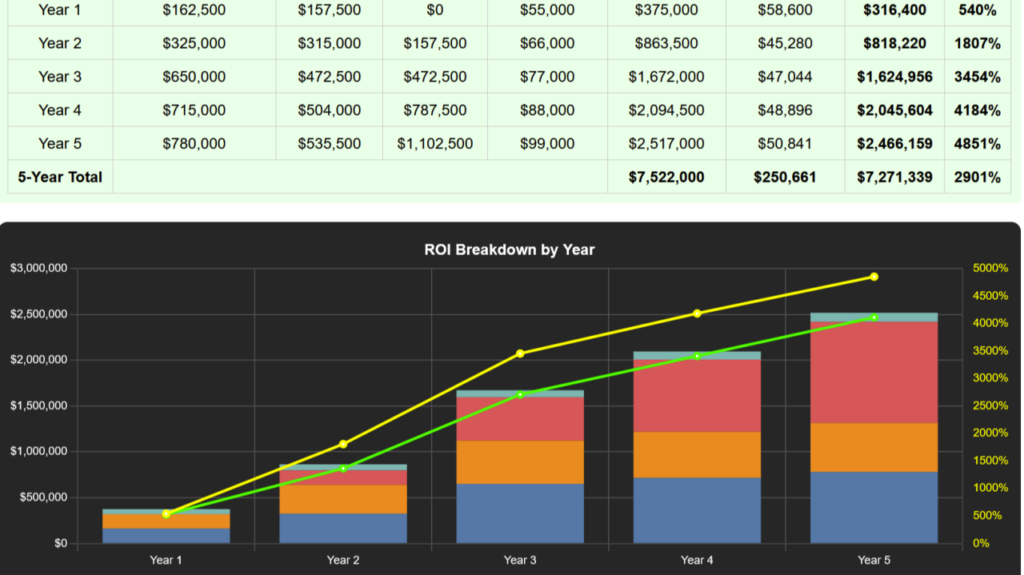Introduction
Artificial intelligence is no longer an emerging concept; it is a present and growing force that is rapidly transforming the IT services landscape. Across every critical area — from end-user self-service to IT engineer workflows, proactive issue management, and autonomous operations — AI is fundamentally altering how organizations deliver and manage IT support.
This article examines the most important shifts happening today: the rise of self-service chatbots that resolve common issues before a human gets involved, AI tools that enhance engineer efficiency, intelligent systems that triage and escalate tickets faster, and the development of agentic AI capable of autonomous decision-making. It also reviews the strong financial return on investment early adopters are already realizing, balanced against real-world challenges such as data quality, cost control, and employee change management.
For Managed Service Providers (MSPs) and internal IT teams alike, AI presents a critical inflection point. Those who embrace it now stand to gain operational advantages, improve client satisfaction, and position themselves as leaders in the next era of IT services.
First a macro viewpoint
AI adoption in IT services has accelerated dramatically. A 2024 McKinsey Global Survey shows 72% of organizations now use AI in at least one business function, up from 50% just a few years ago. Spending has followed suit, with global investment reaching $13.8 billion in 2024 — six times the amount in 2023. IDC forecasts AI will contribute $22.3 trillion to the global economy by 2030.
Despite this growth, many AI projects struggle. Only 48% reach production. Complex implementations, poor data quality, and lack of focus derail progress. Yet, for MSPs, targeted AI deployments — like self-service, ticket scoring, and engineer assist — deliver high ROI with lower risk. Focusing on achievable use cases ensures faster results and stronger ROI.
Empowering End Users: The Role of AI-Powered Self-Service Chatbots
End-user self-service is one of the most practical ways AI improves IT operations today. When well deployed, it resolves 40%–70% of routine issues without escalating to a human engineer. Adoption varies by demographic: younger users adopt faster. Success also depends on the interface. Embedding the chatbot inside Microsoft Teams — not requiring users to visit a separate portal — significantly boosts engagement.
Integration into PSA/ITSM systems is essential. If the bot fails, a seamless handoff to live chat or ticket creation ensures continuity. Tickets must flow bi-directionally, keeping the user informed inside Teams. Done right, self-service reduces ticket volume, increases user satisfaction, and unlocks major cost savings.
Boosting Engineer Efficiency: How AI Tools Are Revolutionizing Service Desk and NOC Operations
MSP engineers — especially Level 1 and 2 — are responsible for resolving end-user issues, handling NOC alerts, and executing support tasks. AI is now augmenting those workflows, reducing the time spent searching for answers or writing responses.
The most effective engineer-assist solutions are delivered via familiar interfaces like Microsoft Teams. AI bots access documentation systems, historical tickets, SharePoint, and RMM data — providing engineers with suggested next steps, relevant articles, and summaries of past resolutions.
AI also assists by drafting customer communications, logging time entries, and scoring tickets to highlight those needing attention. Managers benefit through real-time ticket sorting by engineer, team, or client.

Intelligent Ticket Management: AI-Driven Classification, Prioritization, and Escalation
AI is modernizing ticket handling from intake to closure. Incoming requests can now be automatically categorized, prioritized, and routed based on historical data, sentiment analysis, and workload. AI-generated summaries help engineers understand complex tickets faster. Suggested next steps and reply drafting reduce time to resolution. For managers, AI can flag aging tickets or those likely to miss SLAs.
These functions aren’t replacing humans — they’re augmenting them. Engineers start with better-formed tickets, clearer priorities, and fewer administrative burdens.
Measuring ROI in AI-Driven IT Service Delivery
Achieving strong ROI with AI in IT services requires practical focus, strong adoption, and a staged execution strategy. Real-world results emerge by improving engineer efficiency, empowering end-user self-service, and introducing agentic automation after foundational integrations are complete.
Engineer efficiency gains typically begin with 10%–20% improvements in Year 1, rising to 30%–50% by Year 5. End-user self-service initiatives can reduce ticket volumes by 10% in Year 1 and over 50% by Year 5. Starting in Year 2, agentic AI deployments — such as onboarding/offboarding, RMM alert handling, and repetitive task automation — further compound these savings.
Executive Takeaways
Artificial intelligence is redefining managed IT services. Organizations that adopt early — starting with engineer assist, ticket intelligence, and end-user self-service — will dramatically outpace those that delay.
The opportunity is not only operational efficiency but market dominance. Early adopters will lower their service costs, strengthen margins, compete more aggressively on MRR pricing, and eventually deliver GenAI solutions externally to drive new revenue streams.
For MSPs, the path forward is clear:
1. Invest internally. Drive operational ROI first.
2. Infuse your service delivery model with GenAI.
3. Productize GenAI for your clients.
4. Build a plan, measure progress, and iterate.
Call to Action
This transformation is already underway. If you’re not actively building your GenAI foundation, now is the time to act. Start by implementing GenAI internally to improve engineer efficiency and reduce ticket volumes. Then move to client-facing offerings.
Need guidance to plan your roadmap or launch your AI-powered service model? Contact us at xop.ai or book a conversation directly with Matt Ruck, Founder of xop.ai and former CEO of designDATA. Book a meeting: https://tidycal.com/mattruck


